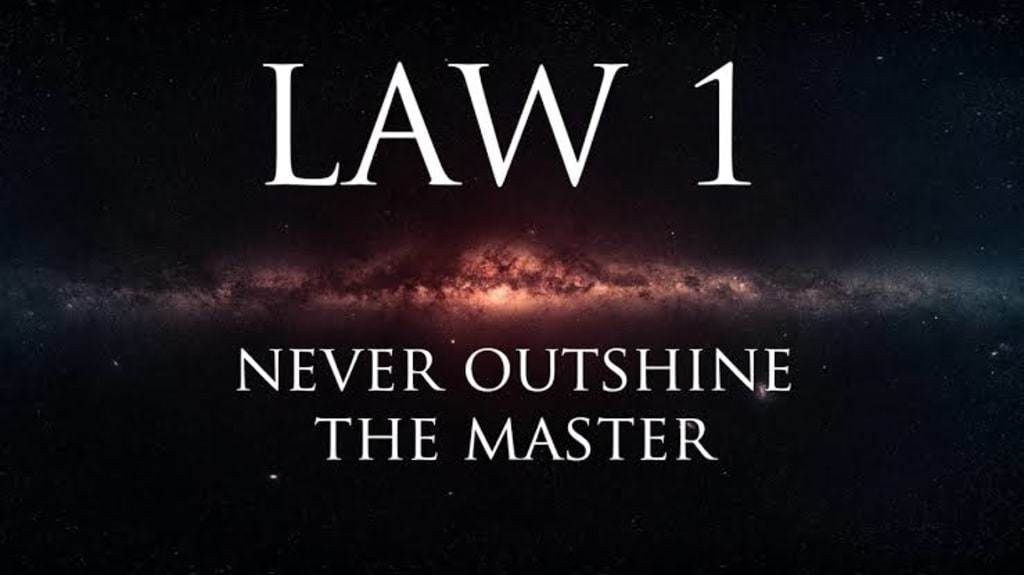Mastering the First Law of Power: Never Outshine the Master
From the "48 laws of power" by Robert Greene

Introduction:
In Robert Greene's highly acclaimed book "The 48 Laws of Power," the First Law holds a prominent place. Often considered one of the most crucial laws, it carries the simple yet profound principle: "Never Outshine the Master." This law offers valuable insights into the delicate dynamics of power and influence, highlighting the significance of humility, subtlety, and strategic maneuvering. In this article, we will explore the essence of the First Law and its practical applications in various domains of life.
Understanding the First Law:
The First Law of Power advises against overtaking or overshadowing those in positions of authority or influence. While it may seem counterintuitive, it stems from the understanding that individuals who relentlessly seek to outshine their superiors can often invoke envy, resentment, and insecurity. Such behavior threatens the established power structure and may lead to dire consequences for the ambitious individual.
The Power Dynamics at Play:
Power dynamics exist in numerous social contexts, including the workplace, politics, and personal relationships. The First Law recognizes that each hierarchy possesses a delicate balance of power and egos. Attempting to surpass or outshine a superior can disrupt this balance and provoke a defensive response from those in power.
The Importance of Subtlety:
Adhering to the First Law of Power requires finesse and subtlety. Instead of overtly challenging or undermining the authority of a superior, one must exercise discretion and maintain a facade of deference. By doing so, individuals can navigate the delicate dance of power without arousing suspicion or hostility. It is crucial to strike a balance between demonstrating competence and respecting the hierarchy.
The Perils of Overstepping Boundaries:
Overstepping the boundaries set by the First Law can lead to severe consequences. Individuals who consistently outshine their superiors risk being perceived as a threat to those in power. As a result, they may face retaliation, isolation, or even removal from positions of influence. It is essential to recognize the potential pitfalls of disregarding the First Law and consider the long-term consequences of one's actions.
Cultivating Loyalty and Support:
Another aspect of the First Law involves cultivating loyalty and support from superiors. Instead of seeking personal glory, individuals can enhance their standing by aligning themselves with those in power. By demonstrating loyalty, providing valuable assistance, and becoming a trusted ally, individuals can secure their position within the existing power structure. This strategy allows them to benefit from the influence of their superiors and build a strong network of support.
Strategic Humility:
Humility plays a vital role in navigating the First Law of Power. By showing respect for those in power and acknowledging their achievements, individuals can create an environment that fosters cooperation and collaboration. Strategic humility does not imply subservience but rather a thoughtful approach that allows for the recognition and appreciation of others' accomplishments.
Application in Various Contexts:
The First Law's applicability extends beyond professional settings and encompasses personal relationships and social interactions. Whether dealing with a demanding boss, influential acquaintances, or family dynamics, understanding the power dynamics at play can help individuals make strategic choices that preserve harmony and enhance their own prospects.
Conclusion:
The First Law of Power, "Never Outshine the Master," serves as a timeless reminder of the delicate dance of power and influence. By exercising subtlety, humility, and strategic maneuvering, individuals can navigate hierarchies and power structures without provoking resentment or envy. Understanding the dynamics outlined in the First Law empowers individuals to maintain their standing, cultivate loyalty, and secure long-term success. As with all laws of power, it is essential to apply them with wisdom, ethics, and a keen awareness of the potential consequences.
*Note: This would be a series so be sure to save this or follow me so you get notified when i post the other parts of this series.
About the Creator
David Odubola
My articles are full of practical advice and relatable example stories. I believe that everyone has the power to change their lives, and I want to help people make that happen. I am currently working on the "48 laws of power ".






Comments
There are no comments for this story
Be the first to respond and start the conversation.